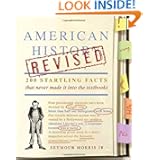I will state upfront, I have not finished this book...yet. But, I am enjoying it so much that I decided to review it first because honestly, I can't imagine it won't be as enjoyable to the end as it has been from the beginning.
The author, Seymour Morris, Jr., indicates in the preface that he wrote this book after being out of the country for about 16 years and being constantly being questioned about America. He states, "the best way to diffuse hostility and single-mindedness was to entertain my audience with little-known stories of history that suggested greater knowledge than theirs, but with humility and a broad perspective." I find this to be true as well, honestly. Meeting people from outside the U.S. is fantastic, but often they treat this country with hostility or a great-than-thou attitude (meaning their country is better than the U.S. because of x, y, and z.). I appreciate Morris' approach to this, as there are times when I am uncertain as to how to proceed with them. While I appreciate the contributions to humanity each country has brought to the world, I also believe that many of the greatest advancements have been made here and while one can not say that the U.S. has not stumbled in some of it's actions, overall the actions have been no less than those of other countries.
Within 10 chapters, Morris breaks down numerous little-known facts throughout history, many of which counter-act what our traditional history books would have us believe. And I for one love it! There are so many antidotes of historical significance that are left out of our history books that honestly make for better history. One of my favorite examples is the night Washington crossed the Delaware, a turning point in the Revolutionary War. The basics we can all recall - on Christmas day in 1776, George Washington decided to attack the British at Trenton, NJ, hoping a victory would buoy the spirits of the colonials. What I remember from my history classes is he crossed the Delaware, marched up to the encampment and won a decisive battle. Go America! What gets missed in this telling, and what I believe would make the telling so much more interesting, is the number of times the British were informed of the coming attack and did nothing. First, a contingent of American soldiers came across the Hessian guards and killed them. When the bodies were discovered, rather than thinking it was the work of soldiers, the British believed it to be the work of local farmers and dismissed it. The commander returned to his Trenton tavern, neglecting to tell the guard to watch the river, when advised to send out a mounted patrol, he declined, saying it could wait til morning. Around midnight, after a night of card playing and drinking, a loyalist farmer tried to speak to the commander, who refused him entry. Still wanting to warn the commander, the farmer sent a note telling him that the Americans had crossed the Delaware. After receiving the note, the commander put it in his pocket, never setting eyes on it. Within three hours, the commander woke to the surprise of General George Washington and his troops about to attack. Personally, I like this telling of Washington crossing the Delaware to the staid and boring rendition we get in our average history books. How much more interesting is it to know that three times the British were warned of an attack and yet they dismissed it?
The entire book is laid out in such a format, little known facts about some of history's most famous events, people, and places, laid out in chronological order. Easy to read, short bursts of facts, and fun tid-bits of information that make traditional history telling pale in comparison. Morris writes in easy to understand language, not stuffy or boring. He throws in little quips and dare I say snarky comments here and there that I honestly found perfectly acceptable and appropriate. Maybe because he wrote what I was thinking as I read the section? This is not your momma's history book, but a fun, intellectual challenge that proves history is anything, but boring.
Personally, this book to me is a fantastic read and should be an addition to the history textbooks used in high schools across the country. To those who claim history is just a bunch of dry facts that have nothing to do with today, read Morris' book. I think you'll find one or two gems that will disabuse you of that notion.

No comments:
Post a Comment